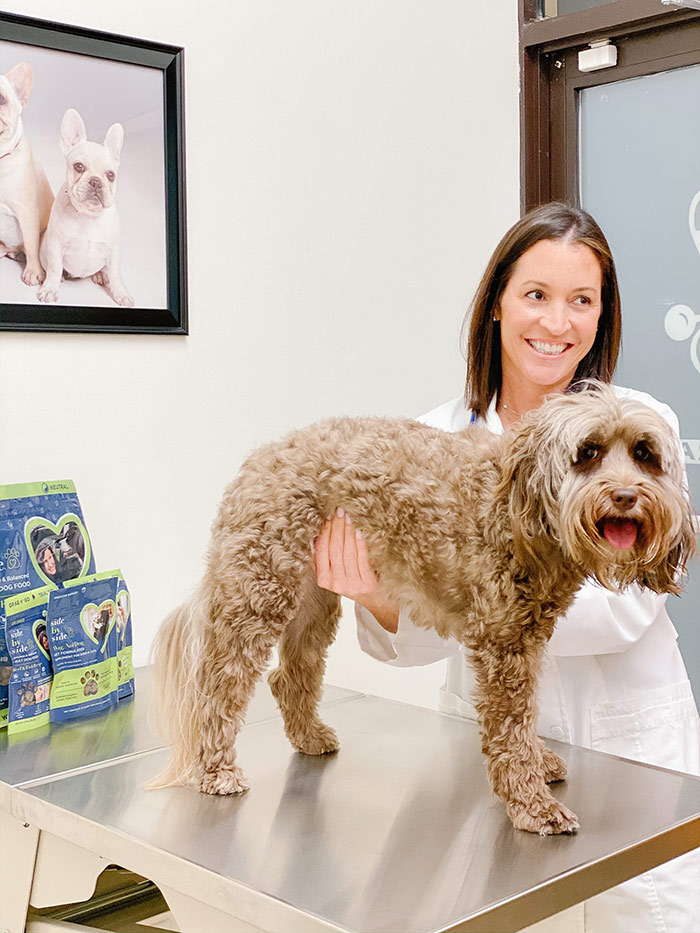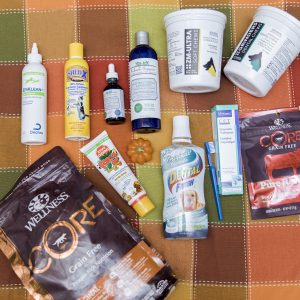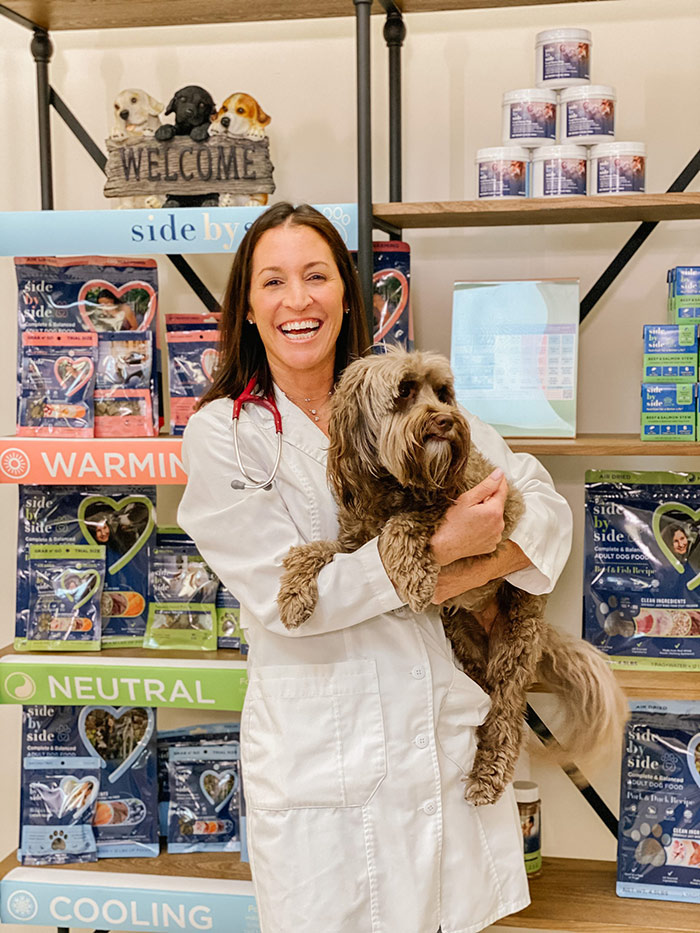
Pets and Skin Allergies: How Can Diet Help?
Spring and summer months can be brutal on those of us with allergies. But it’s also a challenging time of year for our pets. The most common ailment I evaluate and treat at the veterinary hospital this time of year is pet allergies. And finding home remedies to treat dog skin allergies and itching is top priority for many of my pet parents.
At least 75% of my patients will visit me at some point in their lives for itching, scratching, licking, hair loss, redness, scabbing, and ear infections. Unlike humans who present with runny noses, coughing, sneezing, or red watery eyes when allergies attack, our pets’ allergies result in generalized itching, skin infections, and ear infections.
Pet environmental allergies and the manifestations of the disease are extremely challenging to manage in our pets, causing much frustration. After I evaluate pets for allergies, I utilize Western-based medicine to treat the manifestations of this disease. But I also use a holistic, Eastern food therapy approach to treat and manage the pet’s entire body. This approach builds strength and balance, so our pets can manage this disease as best as they can from the inside out.
So let’s discuss environmental allergies in dogs and cats, why pets become so itchy, and ways to help identify, manage, and treat pet allergies. I am going to discuss the Western- and Eastern-based medical approach that I practice with my patients to help combat environmental allergies. Let’s get started!
What are pet environmental allergies (atopic dermatitis)?
Atopic dermatitis (environmental allergies) is an overreaction or hypersensitivity to substances in the environment, such as pollens, grasses, soils, house dust mites, or mold spores, to name a few.
What are the most common clinical signs of atopic dermatitis in pets?
Generally, most allergic pets begin to show signs between 1 and 3 years of age. The most common clinical signs you may see are licking at the paws (many times after coming in from outside), generalized hair loss, scratching, chewing, or biting intensely, skin damage due to scratching or licking, and ear infections.
Are certain pets more likely to develop atopic dermatitis?
Allergies sometimes have a hereditary component. Common breeds often predisposed to atopic dermatitis include but are not limited to Golden Retrievers, Labrador Retrievers, West Highland White Terriers and other terriers, and Bulldogs. Pets living in tropical environments, such as in South Florida, are more likely to be diagnosed with atopic dermatitis.
But how do I know if my pet has allergies?
The first step is to work with your veterinarian to determine if your pet is suffering from allergies, and if so, the cause of the allergic reaction. A food allergy requires placing your pet on a prescription hypoallergenic diet or a nutritionally balanced, whole food recipe designed for your pets needs. If your pet is allergic to fleas, veterinarians can prescribe flea preventatives that are very effective and most importantly, safe for your pets. Environmental allergies are more difficult to treat, but I am excited about some of the new treatment options available.
The second step is to have your veterinarian determine the type of skin infection your pet has for proper treatment. Many times, your veterinarian will recommend skin scrapes, skin cytology, cultures, or bloodwork to assess the type of infection in order to treat your pet’s infection accordingly.
So what can I do to help my itchy pet from a Western medicine approach?
It is important to allow your veterinarian to thoroughly assess and create a treatment plan for your pet’s allergy. There are many treatments available, but every pet is unique. Your veterinarian must prescribe treatment regimens. Here is my top list for treatment of allergies and associated skin infections:
- Weekly medicated shampoos prescribed by your veterinarian
- Omega 3 fatty acids supplementation
- Antibiotics
- Antifungals
- Antihistamines
- Proper and effective flea and tick preventatives
- Immuno-suppressants
- Hypoallergenic vaccinations
- Steroids
- Immunotherapy
- Referral to veterinarian dermatologist
So are there any home remedies for dog skin allergies and itching? What can I do from a holistic, Eastern Food Therapy approach?
I introduced Side by Side Pet food into my animal hospital after witnessing firsthand the remarkable benefits Eastern Food Therapy (EFT) had on my patients. By combining EFT within my practice, I’m providing my pets with the opportunity to live their best life with the benefits of both EFT and Western medicine.
Essentially, in EFT, what we’re doing is analyzing and then translating what we see happening externally as a manifestation of an imbalance in the pet’s body. We can restore balance with whole foods to nourish, replenish, and soothe the body.
How does it work?
From an EFT approach, pets suffering with allergies fall into a warming category and benefit from cooling ingredient diets. The last thing we would want is for these dogs to be eating chicken or turkey, which are classified as WARMING proteins. Why? Because these will exacerbate the problems.
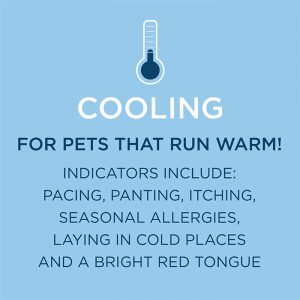
Instead, I recommend a diet with cooling ingredients, like rabbit or pork, to help nourish and heal ailments and to promote overall wellness and health. Instead of treating just the allergy symptoms alone, we’re looking at the diet to restore balance and nourish at the cellular level to help boost the immune system. Boosting the immune system helps ward off environmental allergies before they’re a problem, making our pets less prone to the allergies in the first place!
The fact that we’re doing it with whole food ingredients instead of pills or powders allows for pets to receive these nutrients the way nature intended – with the vitamins, fibers, water content, and minerals that they need for a complete and balanced diet.
Eastern Food Therapy Approach to Pet Allergies
1. Provide Whole Food Nutrition, Balanced, and Complete Cooling Diets
Try these formulas for cooling and soothing your pet’s itchy skin.
Pork and Duck Air Dried Recipes
Cooling Pork and Rabbit Stew
Cooling Rabbit and Blueberry Treats
2. Include Supplements to Restore Balance and Health of the Gastrointestinal Tract and Improve the Health of the Skin
Food and supplements with foods rich in Omega-3s help brain and cell function. Omega-3s have incredible anti-inflammatory properties that many dogs need during allergy season. Omega-3 fatty acids also provide optimal nourishment to the skin and coat and help relieve joint pain!
Reduce the flaky, itchy skin and excessive shedding. Help skin retain moisture and hydration. Restore the balance of your pet’s skin by starting with the digestive tract with these Side by Side Pet supplements.
Shine Through Supplements
Belly Balance Probiotics
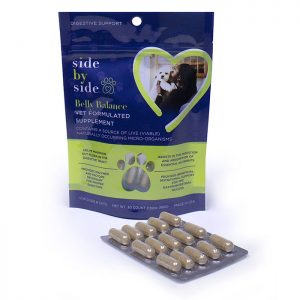
I would likely start with a round of these probiotics. Allergy symptoms may be exacerbated if the dog’s digestive system is not functioning as a balanced system. Having a healthy gastrointestinal (GI) tract is essential for dogs because this is where all food nutrients are absorbed and assimilated by the body. Undetected imbalances in the flora can cause chronic mild dehydration, electrolyte imbalances, and susceptibility to infections. Imbalances may also interfere with the ability of the immune system to work properly. Probiotics will help bring balance and harmony to the GI tract, allowing your dog to heal naturally.
Final Thoughts on Home Remedies for Dog Skin Allergies and Itching
I love learning and utilizing treatment options that help ease suffering in pets. These newer therapies are replacing older treatment options, such as steroids, that can be harmful on the body with long-term use.
Controlling common allergies and itching in pets is difficult and frustrating for me, as a veterinarian. But it’s even more so for my patients and their parents. I cannot stress enough that environmental allergies in dogs and cats are not curable, only manageable. I am always excited when new treatment options become available and finding home remedies for treating dog skin allergies and itching is a plus!
As always, my number one goal is to make sure our pets are happy and healthy. If you have any questions or concerns, always contact your veterinarian. They are your best resource to ensure the health and well-being of your pets.